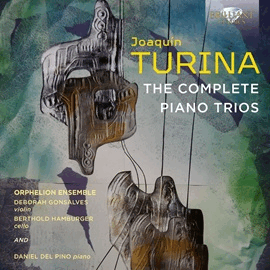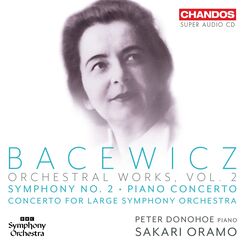Grazyna Bacewicz, eine Schülerin von Nadia Boulanger, hat bei der französischen Lehrerin solide Handwerksarbeit gelernt. Das zeigt sich in allen ihren Kompositionen. Dazu kam eine Einfallskraft, die sie ja nicht nur in ihrer Musik, sondern auch in Kurzgeschichten und Romanen zeigte.
Sakari Oramos zweites Bacewicz-Album beginnt mit der brillanten 2. Symphonie aus dem Jahre 1951 mit drei kraftvoll-virtuosen Sätzen und einem lyrischen langsamen Satz. Oramo dirigiert kraftvoll und engagiert, aber die Musik hat man bei Luzkasz Borowicz mit mehr Raffinement und Inspiration gehört (Rezension siehe unten)
Bacewiczs Klavierkonzert von 1949 gewann beim Kompositionswettbewerb zu Chopins 100. Todestag den 2. Preis (ein erster wurde nicht vergeben). Im Grunde ist das Werk neoklassisch, aber auch rhetorisch-dramatisch und ideenreich, so dass man ihm auch in gewisser Hinsicht eine neoromantische Qualität zugestehen kann. Die Interpretation ist kraftvoll, kommt aber in den Ecksätzen nicht an jene von Peter Jablonski und dem Finnish Radio Symphony Orchestra unter Nicholas Collon heran, aber sie ist im Andante viel stimmungsvoller.
Das Konzert für großes Symphonieorchester entstand 1962 auf Anregung des Dirigenten Witold Rowicki und ist diesem gewidmet. Die Interpretation ist längst nicht so kohärent und überzeugend wie jene von Lukasz Borowicz, der mit dem WDR-Orchester viel suggestiver wirkt. (siehe unten).
Grazyna Bacewicz, a student of Nadia Boulanger, learned solid craftsmanship from the French teacher. This is evident in all her compositions. In addition, she had a power of imagination, which she showed not only in her music, but also in short stories and novels.
Sakari Oramo’s second Bacewicz album begins with the brilliant 2nd Symphony from 1951 with three powerful, virtuoso movements and a lyrical slow movement. Oramo’s conducting is powerful and committed, but the music has been heard with more refinement and inspiration with Luzkasz Borowicz (see review below)
Bacewicz’s Piano Concerto from 1949 won 2nd prize in the composition competition on the 100th anniversary of Chopin’s death (no first prize was awarded). The work is basically neoclassical, but also rhetorically dramatic and rich in ideas, so that it can also be considered to have a neo-romantic quality in certain respects. The interpretation is powerful, but does not come close to that of Peter Jablonski and the Finnish Radio Symphony Orchestra under Nicholas Collon in the outer movements, but it is much more atmospheric in the Andante.
The Concerto for large symphony orchestra was written in 1962 at the suggestion of the conductor Witold Rowicki and is dedicated to him. The interpretation is nowhere near as coherent and convincing as that of Lukasz Borowicz, who is much more evocative with the WDR orchestra. (see below).
https://www.pizzicato.lu/virtuose-orchesterstucke-von-grazyna-bacewicz/


















